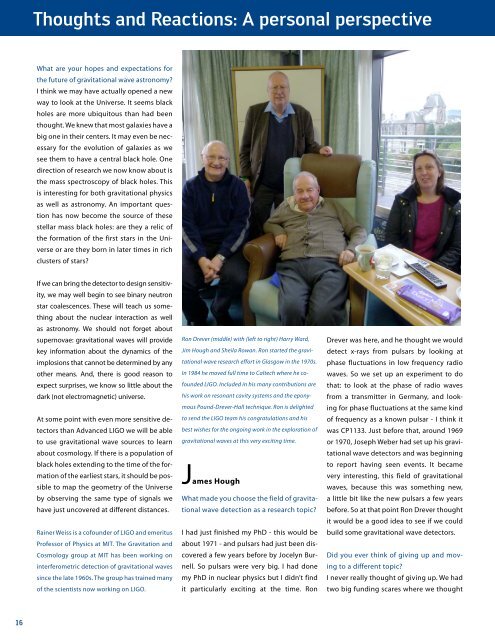LIGO
1M1Oj6U
1M1Oj6U
You also want an ePaper? Increase the reach of your titles
YUMPU automatically turns print PDFs into web optimized ePapers that Google loves.
Thoughts and Reactions: A personal perspective<br />
What are your hopes and expectations for<br />
the future of gravitational wave astronomy?<br />
I think we may have actually opened a new<br />
way to look at the Universe. It seems black<br />
holes are more ubiquitous than had been<br />
thought. We knew that most galaxies have a<br />
big one in their centers. It may even be necessary<br />
for the evolution of galaxies as we<br />
see them to have a central black hole. One<br />
direction of research we now know about is<br />
the mass spectroscopy of black holes. This<br />
is interesting for both gravitational physics<br />
as well as astronomy. An important question<br />
has now become the source of these<br />
stellar mass black holes: are they a relic of<br />
the formation of the first stars in the Universe<br />
or are they born in later times in rich<br />
clusters of stars?<br />
If we can bring the detector to design sensitivity,<br />
we may well begin to see binary neutron<br />
star coalescences. These will teach us something<br />
about the nuclear interaction as well<br />
as astronomy. We should not forget about<br />
supernovae: gravitational waves will provide<br />
key information about the dynamics of the<br />
implosions that cannot be determined by any<br />
other means. And, there is good reason to<br />
expect surprises, we know so little about the<br />
dark (not electromagnetic) universe.<br />
At some point with even more sensitive detectors<br />
than Advanced <strong>LIGO</strong> we will be able<br />
to use gravitational wave sources to learn<br />
about cosmology. If there is a population of<br />
black holes extending to the time of the formation<br />
of the earliest stars, it should be possible<br />
to map the geometry of the Universe<br />
by observing the same type of signals we<br />
have just uncovered at different distances.<br />
Rainer Weiss is a cofounder of <strong>LIGO</strong> and emeritus<br />
Professor of Physics at MIT. The Gravitation and<br />
Cosmology group at MIT has been working on<br />
interferometric detection of gravitational waves<br />
since the late 1960s. The group has trained many<br />
of the scientists now working on <strong>LIGO</strong>.<br />
Ron Drever (middle) with (left to right) Harry Ward,<br />
Jim Hough and Sheila Rowan. Ron started the gravitational<br />
wave research effort in Glasgow in the 1970s.<br />
In 1984 he moved full time to Caltech where he cofounded<br />
<strong>LIGO</strong>. Included in his many contributions are<br />
his work on resonant cavity systems and the eponymous<br />
Pound-Drever-Hall technique. Ron is delighted<br />
to send the <strong>LIGO</strong> team his congratulations and his<br />
best wishes for the ongoing work in the exploration of<br />
gravitational waves at this very exciting time.<br />
James Hough<br />
What made you choose the field of gravitational<br />
wave detection as a research topic?<br />
I had just finished my PhD - this would be<br />
about 1971 - and pulsars had just been discovered<br />
a few years before by Jocelyn Burnell.<br />
So pulsars were very big. I had done<br />
my PhD in nuclear physics but I didn’t find<br />
it particularly exciting at the time. Ron<br />
Drever was here, and he thought we would<br />
detect x-rays from pulsars by looking at<br />
phase fluctuations in low frequency radio<br />
waves. So we set up an experiment to do<br />
that: to look at the phase of radio waves<br />
from a transmitter in Germany, and looking<br />
for phase fluctuations at the same kind<br />
of frequency as a known pulsar - I think it<br />
was CP1133. Just before that, around 1969<br />
or 1970, Joseph Weber had set up his gravitational<br />
wave detectors and was beginning<br />
to report having seen events. It became<br />
very interesting, this field of gravitational<br />
waves, because this was something new,<br />
a little bit like the new pulsars a few years<br />
before. So at that point Ron Drever thought<br />
it would be a good idea to see if we could<br />
build some gravitational wave detectors.<br />
Did you ever think of giving up and moving<br />
to a different topic?<br />
I never really thought of giving up. We had<br />
two big funding scares where we thought<br />
16


